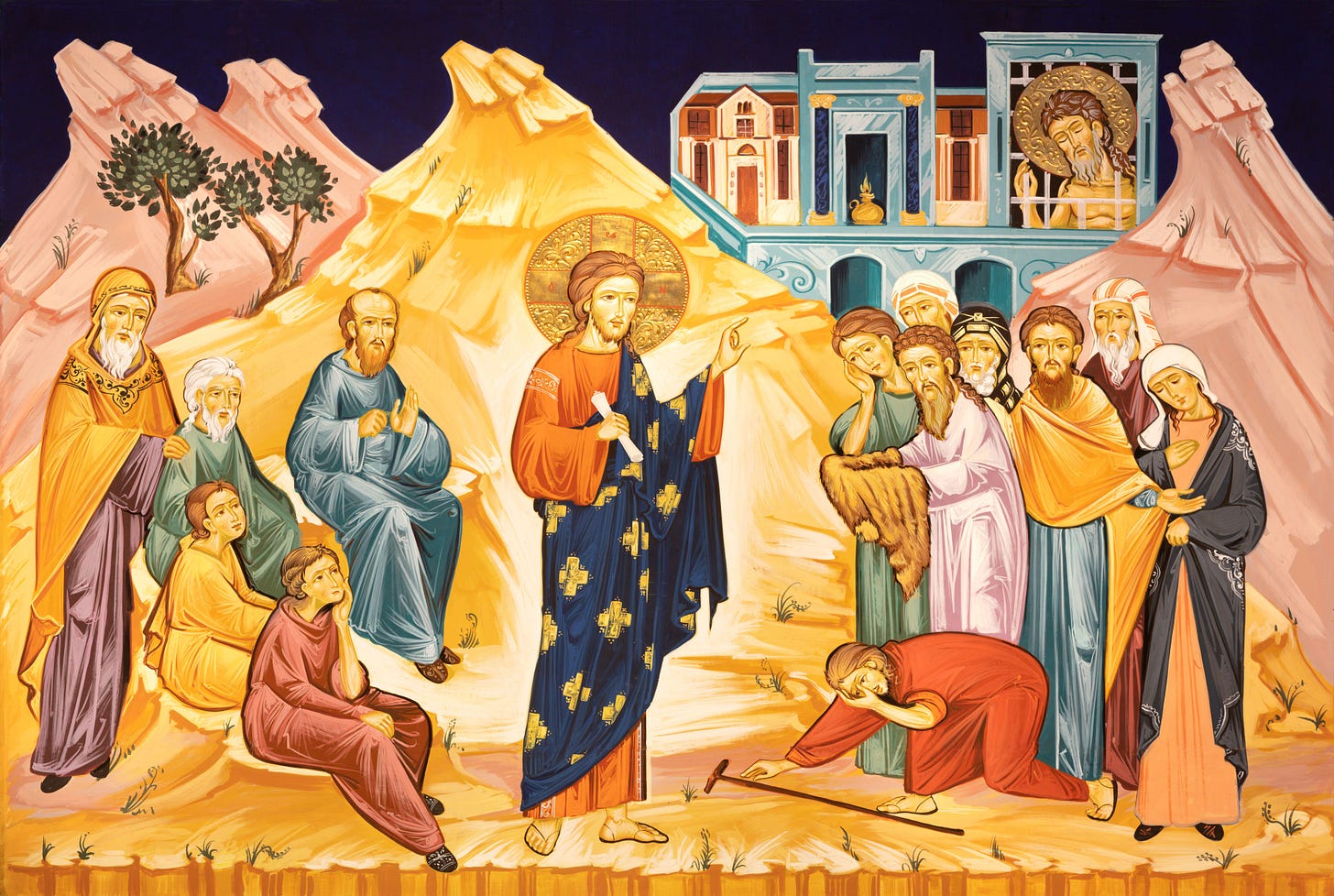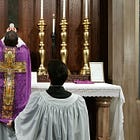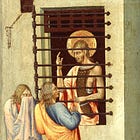'Art thou he that art to come?' The Baptist's Final Witness
Did St John the Baptist doubt Our Lord? Why did Our Lord answer the way he did? And why is this passage read on the Second Sunday in Advent?

In this chapter, Fr Coleridge tells us…
How and when miracles are necessary—and unnecessary
How Christ’s proof to the Baptist’s disciples continues today in the Church
How miracles are related to prophecy in proving Christ’s credentials
He also concludes his previous discussion about St John the Baptist’s supposed doubts about Christ—and shows us instead what he intended by this message to Christ.
This Gospel is read on the Second Sunday of Advent.
It is curious that the Advent Gospel readings appear in reverse chronological order:
The last witness of St John the Baptist (and Our Lord’s witness to him)
St John the Baptist’s declaration of his mission
The first witness of St John the Baptist.
This reverse chronological order also recalls the curious mnemonic ‘ERO CRAS,’ spelt out by a reversal of the ‘O Antiphons’ from the 17th December. It is as if the Roman liturgy is engaging in a kind of “countdown” to Christmas.
These readings also show how central the Forerunner of Christ is in this period.
Naturally, this is because St John the Baptist went before Christ, to prepare the people for his coming. There is a fittingness about these readings appearing in Advent.
However, we should recall that on a strictly rationalist or historical basis, St John the Baptist was still a mere infant at the time of the Nativity. He was not preparing for Christ’s birth, but for his mission and his manifestation.
As such, while readings about his mission certainly has applicability to the historical event of Christmas, they also point to what we have been discussing elsewhere, namely the focus which Advent has on the second coming of Christ at the end of time.
We have addressed this, and how the Roman Liturgy presents this matter, below:
The Last Witness of St John the Baptist—Part II
From
The Training of the Apostles Vol. II
Fr Henry James Coleridge, 1889, Ch. XIII, pp 253-61
St. Matt. xi. 2-6; St. Luke vii. 17-23;
Story of the Gospels, § 52
Sung on the Second Sunday of Advent
The Message of St. John
‘Art Thou He that art to come, or look we for another?’
It is interesting to note how the same question may be put in a captious and in a devout and simple manner by different persons, according to the state of their heart.
This question was in the minds of all men at this time, and our Lord was always practically giving it an answer. But it was the complaint of His enemies that He would not tell them openly Who He was. He let His works speak for Him, and He relied on the evidences with which, as has been said, the Father in His providence accredited His Mission.
He would not be dictated to, as we shall see, as to signs from Heaven, or even as to plain open declarations for which those who sought them were not fit, and which, indeed, they only sought with a view of using them against Him. When at last the time came for Him to be adjured by the living God to tell them whether He was the Christ, He did so, and we know what was the result in His enemies of that open declaration.
They would not receive His testimony concerning Himself, and yet, as He had said on a former occasion, when they had challenged Him as bearing witness to Himself, He answered, ‘Although I give testimony of Myself, My testimony is true, for I know whence I come and whither I go, but you know not whence I come or whither I go.’1
The evidence of miracles
Nor can it be admitted as a rule, concerning the messengers of God, even inferior in authority to our Lord, that they are not to be listened to in what they say of themselves.
It was His great humility, and much more His consummate prudence, that made Him say so little concerning Himself. And we know that even to His disciples He did not speak plainly and openly, until quite the end of His sojourn with them.
It is also to be noted that the truth of our Lord’s Mission, and especially the truth of His Divine Personality, which was most clearly and continually claimed by Himself, may be most fairly and cogently urged on those who already admit Him to have the evidences of Divine Mission, such as miracles and the like, the fulfilment of prophecy, and other such demonstrations, because it is impossible to think of God that He would so accredit a Person Who could speak the slightest untruth concerning Himself.
And this is, in the same way, to be taught concerning the Catholic Church, that she after all is the witness to her own prerogatives, and what she claims for herself, as to her position in the world, and as to the obedience which is due to her, in whatever order, must be a true claim.
Thus, if our Lord had answered the message of the blessed Precursor by a simple affirmation of His Divine Mission, He would not have made any unreasonable claim. But as has been said, the order of Providence was that the Divine character of His Mission was to be attested by miracles, and therefore it was to them that He appealed.
But in the arguments of Christian apologists or missioners or preachers, for such a truth as the Divinity of our Lord, it is perfectly reasonable to appeal to His own sayings concerning Himself, and, as it was put some years ago by a great preacher in France, we must believe that He was God, because He said it Himself.
Our Lord’s answer—Miracles
In answer to the messengers of St. John on this great occasion, our Lord did two things. They found Him, as it seems, teaching the multitude, or they were taken by Him to be present at such a teaching. The crowds were thronging round Him, as has been elsewhere described, and power or virtue went forth from Him to heal them all. He took the occasion to work a number of visible and obvious miracles.
‘In that same hour,’ St. Luke tells us, ‘He cured many of their diseases and hurts, and evil spirits; and to many who were blind He gave sight.’
That is, He set before the messengers of St. John the evidence of His miracles. This must have struck them with greater force, because it had not been in the Providence of God that St. John himself should work any miracle. This evidence of Divine Mission had been vouchsafed to many of the ancient prophets, some of whose miracles are only less wonderful than those of our Lord Himself.
But it had not been granted in the case of St. John, whose mission was simply to awaken consciences, by the preaching of known truths of the moral order, and whose great power lay in the evident sanctity of his life and character, and in the force of his direct and severe preaching. Thus the evidence of miracles was kept, in this stage of the economy of the Incarnation, for our Lord Himself, and it was afterwards, as we shall see, extended to the Apostles, even before the time of the Passion.
This then would have been a most cogent argument to be used by St. John when the messengers returned to tell him what they had seen and heard, that is, what others told them of their own experience as to the miraculous gifts exercised by our Lord.
Reference to prophecy
But our Lord also added a further proof, which was in a manner necessary for the completion of that which was furnished by the miracles.
It has been explained elsewhere that miracles by themselves may not uniformly be a perfect proof of the Divine character of a mission, such as that of our Lord and the Church, unless they are accompanied by the further witness of prophecy, which fixes the evidence of that mission.
When St. John had put his question to our Lord in the words used by the disciples of the former, he had distinctly alluded to the promises and the prophecies. He had not said simply, ‘Art Thou a Divine Teacher?’—but ‘Art Thou He that is to come? Art Thou He for Whom we are looking?’
These words imply that One was to come, and they consequently invite a reference to the marks which were to characterize Him when He did come. Thus our Lord was enabled by the prudent question of His Precursor to add this further confirmation to the witness of the miracles.
He did not do this in so many words, that is, He did not appeal directly to any of the many prophecies concerning Himself, quoting the words of the Prophet, but He did the same thing in His own way, ever seeking to exercise humility and meekness, by simply answering the messengers in the words of one of the Prophets:
‘And answering He said to them, Go and relate to John what you have heard and seen: the blind see, the lame walk, the lepers are made clean, the deaf hear, the dead rise again, to the poor the Gospel is preached, and blessed is he whosoever shall not be scandalised in Me.’
Words of Isaias
These words are taken from the prophecies of Isaias, though they do not all occur in the same place. They are rather an accumulation of notes of the Messias, as given by the prophet, which would sum up in a convenient way his testimony concerning our Lord.
In his thirty-seventh chapter, Isaias had described the days of the Messias thus:
‘Then shall the eyes of the blind be opened, and the ears of the deaf shall be unstopped. Then shall the lame man leap like a hart, and the tongue of the dumb shall be free, for waters are broken out in the desert, and streams in the wilderness.’
The other great passage in Isaias, in which the characteristics of the Messias and His times are described, had been already quoted by our Lord in His discourse in the synagogue of Nazareth, on the Sabbath day on which He had given His fellow-citizens so much offence by refusing to work miracles to satisfy their curiosity, and to put them, as it were, on a level with the people of Capharnaum:
‘The Spirit of the Lord is upon me, because the Lord hath anointed me. He hath sent me to preach to the meek, to heal the contrite of heart, and to preach a release to the captives, and deliverance to those that are shut up.’
This is in the sixty-first chapter of Isaias. The words now used by our Lord, therefore, are almost entirely taken from the prophet, though they are not a simple quotation of any single passage.
They would serve the purpose of the Precursor, if he wished to show in detail that the very works of which his disciples had been the witnesses were exactly those which had been promised as evidence of the Messias and His Divine Mission, while at the same time the appeal, so to call it, made by our Lord was not formally to the prophet himself so much as to the works of which, nevertheless, the prophet had spoken.
Thus the twofold witness of works of miraculous power and mercy, and of the special prediction of those works, was kept open to the use of the blessed Precursor in his prison.
‘He that is to come’
It must be remembered, also, that St. John had not distinctly referred to the prophecies in his message of inquiry. He had only said, ‘Art Thou He that art to come, or do we look for another?’ For the expectation of the whole human race, since the Fall, has ever been for a Deliverer and Redeemer.
Even if the prophecies and promise had not existed, there would always have been a craving in the hearts and consciences of men for someone like our Lord. No true idea could be entertained, even partially, of the goodness of God, of the Power and Wisdom and Mercy which are witnessed to by His revelations of Himself in the visible creation and in Providence, without the suggestion of the hope of some interference on His part for the relief of the deep miseries of the condition of man.
Nor could any true idea be formed of those miseries themselves, without its including the discernment of the greater gravity of the moral evils of mankind, in comparison with their physical sufferings.
In this way the diseases and maladies which afflicted so large a portion of the human race, and made earth a vast lazar-house, were but imperfect representations and types of the moral maladies by which the souls of men were sick even unto death.
Thus the miseries mentioned by the prophets were very easily understood in their moral significance, and the blindness, or lameness, or leprosy, or diseases, of which there were so many instances on every side at every time, were easily taken as figures of the incapacity to see the truth, or to walk in the path of justice, or to hear the inspirations of God, or the voice of conscience, and so on.
The whole human race yearned for a Physician Who might have power to cure its manifold moral diseases, far more grievous in themselves than those which afflict the body, and calling piteously on the mercy of God Who had made the soul which they infected, degraded, and made its own worst torturer, not perishable like the mortal body, but endowed with immortality like His own, the prospect of which was awful indeed if there were to be for it no healing.
He that was to come must be One Who could do this, whether He came with physical power of healing or not. In this sense the words of St. John are forever sounding in the ears of the Church, which represents our Lord: ‘Art Thou He that art to come, or do we look for another?’
System of Our Lord
And the answer to the question is to be found in the power which the religion and system of our Lord have shown to heal every sickness and every disease of human nature and of the condition of mankind. It is found in the satisfaction that they give to all the cravings of human nature, moral, intellectual, spiritual, answering exactly to every woe by an adequate cure.
And the remedies provided by our Lord for all our manifold maladies are beautifully expressed in the words which He quoted from the Prophet.
The blind see, for the moral and spiritual darkness is dispelled, and the simplest Catholic child knows more about God, and the soul, and the conditions of salvation, and the means of grace, and the Law of God, and the issues of eternity, than all the philosophers of the ancient world.
The lame walk, for the practice of Christian virtues, and even of Christian perfection, is easy to those who have the light and guidance of the Holy Ghost and the Catholic Church, and the powerful aids and supports of the Christian sacraments.
The lepers are made clean, for the foul stains and contaminations of sin are continually washed off from thousands of souls, in the life-giving waters of Baptism and in the blessed Sacrament of Penance. Thousands keep the innocence of their Baptism, and thousands more regain it by the application of the Precious Blood of our Lord to souls which have been before defaced by sin.
The deaf hear, for the conscience is quickened, the ears of the soul are opened to the Christian preaching and the whispers of the Holy Ghost.
The dead rise again, when the soul dead in sin is restored to spiritual life.
And the final characteristic of His Mission on which our Lord delights to dwell, that which He sums up in the words, ‘To the poor the Gospel is preached,’ proves that He is He that was to come.
The Gospel preached to the poor
This last characteristic of the true Mission of the Redeemer of the world, the One Whom all men expect and desire, is probably expressed in those words of Isaias in which our Lord is said to be sent to preach to the meek, for so it is translated in the passage of St. Luke in which the quotation is first made by our Lord, and which relates to His teaching in the synagogue of Nazareth.
For the right dispositions for the reception of the Gospel teaching are just those of meekness, humility, gentleness, submissiveness, docility, and the like, which are the characteristics also of poverty of spirit, and which are naturally generated, so to say, by the practice and condition of actual poverty in those who do not oppose any hindrance to the workings of grace.
For the preaching of the Gospel is with authority, and this is distasteful to pride and arrogance, such as are but too naturally the consequences of riches and independence. Moreover, the whole burthen of the Gospel teaching is that the good things of this world are not true goods, that they are even dangers, and snares, and impositions. This is a truth much more easily realized by the poor than by the rich.
Again, the preaching of the Gospel involves the doctrine of the Cross, and this again is more easily received by those who are not weighted by the heavy chains of the good things of this world. And, on the other hand, it is characteristic of the Gospel that it is the preaching of faith, and faith is a gift which belongs to all alike, which is the same in the learned and in the unlearned, in the simple and in the cultivated, in the ignorant as in the philosopher or the man of science—if indeed it be not actually a difficulty for men trained in the wisdom of this world to submit themselves to the simple authority of the teaching of the Gospel.
And the preaching which addresses itself to the poor is always a disinterested teaching; it cannot be the teaching of men who seek to profit by it, or who care for the applause and esteem of men. Any teaching that fulfils the conditions of the doctrine which is to satisfy the wants of humanity must be a simple teaching, one that can be understood and taken in by the multitude, one which appeals to faith, and one which is thoroughly unworldly in its doctrine.
Danger of taking scandal
Our Lord adds to the words which seem to refer to the prophecies in their widest sense some others which are entirely His own. He has been setting before the disciples of St. John the very evidences of His Mission which He had in vain adduced to the wise and learned Scribes and Priests of Jerusalem.
They had turned away from Him, and the main ground of their rejection of this great benefit of God for their salvation was, no doubt, His apparent want of all great and striking qualities in the eyes of the world. To the rulers at Jerusalem He was always the claimant to prophetic powers who came from an obscure village in Galilee, who herded with the common people, who had never learned in the schools of the Scribes, who was said to be the son of a carpenter, and whose whole demeanour and bearing bespoke Him only one of the lower people.
Greater trials of the same kind were in store for those who might be inclined to put their faith in Him. He was actually under persecution and proscription, and all who clung to Him were likely enough to suffer under the same treatment with Himself. He knew the whole future, and how the opposition to His teaching was to grow more and more savage and unscrupulous, shrinking at no calumny, and fearing no wickedness for the sake of His destruction.
Calvary itself was at no great distance, and it was well, therefore, to add to the declaration of the evidences for His Mission a warning as to the possible temptations which would soon beset His followers.
There were to be occasions enough of scandal, not, indeed, to the blessed Baptist himself, but to those whom he had sent, or to hundreds of others, who were as yet following our Lord’s footsteps but were in danger of falling away. As it was in our Lord’s time, so it has ever been in the history of the Church. The victims of scandal were to be numbered by thousands, and their fall was to give a prophetic meaning to the warning:
‘Blessed is he whosoever shall not be scandalized in Me.’
From Fr Henry James Coleridge, The Training of the Apostles Vol. II
Here’s why you should subscribe to The Father Coleridge Reader:
Coleridge provides solid explanations of the entirety of the Gospel
His work is full of doctrine and piety, and is highly credible
He gives a clear trajectory of the life of Christ and all its stages.
If more Catholics knew about works like Fr Coleridge’s, then other works based on sentimentality or dubious private revelations would be less attractive.
Sourcing and curating the texts, cleaning up scans, and editing them for online reading is a labour of love, and takes a lot of time.
Will you lend us a hand and hit subscribe?
Read next:
Follow our projects on Twitter, YouTube and Telegram:
St. John viii. 14.






